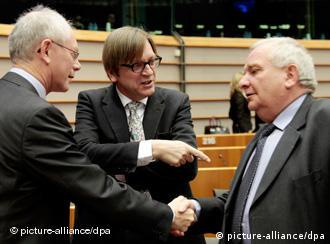Europe's dividing lines in the debt crisis run between the rich
North and less well-off South - at first glance, anyway. But closer
examination suggests the truth is more complicated.
Long before the current debt and economic crisis, statistics showed a
gap in buying power between northern and southern nations in the
European Union. For decades, the rule of thumb had been that the
well-off people live in northern Europe while those in the south are
less well-to-do.
The outlook shifted in 2004 when Eastern European and former communist states joined the bloc. The general rule changed to Western European countries having a higher standard of living than their counterparts in the East.
The population of Luxembourg booked the highest buying power with 271 percent of the European average. Italy and Spain were about average for the 27-member European Union. Meanwhile, Romania and Bulgaria had just 46 percent and 44 percent of the bloc's average per capita buying power. At 118 percent, Germany sat in the table's upper-middle range.
The distribution of rich and poor in Europe has not undergone major changes due to the economic crisis. Aid from the rescue fund has, so far, gone out to countries like Greece and Portugal, although buying power in Greece is 90 percent of the European average and 80 percent in Portugal.
The Northern European country of Ireland has also received billions from the fund even though its buying power was 128 percent of the European average and well above Germany's, the country bearing the most risk for the rescue fund. A simple North-vs.-South pattern also does not fit for Spain and Italy, which have paid more into the rescue program. Cyprus, which has also requested aid, is on par with Spain and Italy with its 99 percent buying power rating.
 Luxembourg is on top in terms of buying power
Luxembourg is on top in terms of buying power
Upon examination, it seems the debt crisis is less connected to wealth and poverty than it is to current financial and budgetary policies. Estonia, which is statistically regarded as one of Europe's poorer countries, has nearly no debt and is running a budget surplus.
New divisions
The Finnish Europe Minister Alexander Stubb said he sees new divisions in the European Union.
"We have quite a few different types of coalitions in the European Union nowadays, and I think it's a waste of time to talk about founding states versus new states and North versus South - and certainly East versus West," he said, adding, "The coalitions inside the European Union are functionally based. They depend on the area: 'Are you in the euro or not,' 'Are you pro-single-market or not,' 'Are you a triple-A country or not?' The divisions are completely new."
The real divisions today involve states that are pushing for sharing debt across the currency union and those that are against the practice, said former Belgian Prime Minister Guy Verhofstadt. Germany, Finland and the Netherlands are the last three countries in the 17-member eurozone that oppose issuing common eurobonds. Verhofstadt, who currently heads the liberal-democratic group in the European Parliament, said deciding on debt will decide the fate of the EU.
"It is a dispute about the future of the European Union itself," he told DW. "I think everybody who is analyzing in an appropriate way what is happening now sees that the euro can only survive and the euro crisis can only be overcome by the establishment of a full-fledged economic, fiscal and political union - including a common bond market. If [German] Chancellor Merkel does not realize this then she is making a big mistake."
The fact that France is also pushing for common eurobonds has weakened the German-French motor that has traditionally helped drive the EU, Verhofstadt added.
The significant differences in economic performance within the EU led Hans-Olaf Henkel, a former president of the Federation of German Industry, to the controversial idea that the euro be split into a northern-euro for countries north of the Alps and southern-euro for the rest of Europe.
 Guy Verhofstadt: Full political union is the answer
Guy Verhofstadt: Full political union is the answer
"By now it must be clear to every economist - and not just economists - that the euro is much too weak for northern countries and that it has become much too strong for southern ones," he said. "For me it has turned into a ludicrous export development plan for German industry. If our exports have it relatively easy with a weak euro then it is going to be up to tax payers and their kids to pay for the financial effect in the South. It's crazy."
Once a strong supporter of the common currency, Henkel said he has gown to accept the idea of the EU splitting into a pair of entities split by geography.
Inflation across Europe
When it comes to inflation in the euro countries, Brussels economist Zsolt Darvas sees a dividing line between North and South. In the North, inflation is too low, and, in the South, it is too high, he said. Money inflows from the North caused the excessive inflation in the South, and those investments also led to the housing bubble in Spain, Darvas told DW.
"In the future, that should be reversed because the southern states at the moment are not competitive. That means that they cannot export enough to export to pay off their debts abroad. There should thus be higher inflation in the North and lower inflation, or even deflation, in the South," he argued.
 Bulgaria fares much less well on the buying power scale
Bulgaria fares much less well on the buying power scale
Preventing enmity
For decades, the wealthy countries of the EU have transferred billions of euros in structural aid to the less wealthy countries. That's because the equalization of the economic situation is one of the fundamental tasks of the Union. The community's principle of solidarity has yet to be questioned, although there have often been sharp disagreements in the budget negotiations between net payers and net recipients.
Over the years, Greece has been one of the largest net aid recipients. In an interview with the news magazine "Der Spiegel" this week, Italian Prime Minister Mario Monti lamented the mutual prejudice - even enmity - between North and South that has reappeared.
"This is very troubling, and we must fight it. I'm sure that most Germans have an instinctive sympathy for Italy, just as the Italians admire the Germans for their many qualities," he said.
The outlook shifted in 2004 when Eastern European and former communist states joined the bloc. The general rule changed to Western European countries having a higher standard of living than their counterparts in the East.
The population of Luxembourg booked the highest buying power with 271 percent of the European average. Italy and Spain were about average for the 27-member European Union. Meanwhile, Romania and Bulgaria had just 46 percent and 44 percent of the bloc's average per capita buying power. At 118 percent, Germany sat in the table's upper-middle range.
The distribution of rich and poor in Europe has not undergone major changes due to the economic crisis. Aid from the rescue fund has, so far, gone out to countries like Greece and Portugal, although buying power in Greece is 90 percent of the European average and 80 percent in Portugal.
The Northern European country of Ireland has also received billions from the fund even though its buying power was 128 percent of the European average and well above Germany's, the country bearing the most risk for the rescue fund. A simple North-vs.-South pattern also does not fit for Spain and Italy, which have paid more into the rescue program. Cyprus, which has also requested aid, is on par with Spain and Italy with its 99 percent buying power rating.
 Luxembourg is on top in terms of buying power
Luxembourg is on top in terms of buying powerUpon examination, it seems the debt crisis is less connected to wealth and poverty than it is to current financial and budgetary policies. Estonia, which is statistically regarded as one of Europe's poorer countries, has nearly no debt and is running a budget surplus.
New divisions
The Finnish Europe Minister Alexander Stubb said he sees new divisions in the European Union.
"We have quite a few different types of coalitions in the European Union nowadays, and I think it's a waste of time to talk about founding states versus new states and North versus South - and certainly East versus West," he said, adding, "The coalitions inside the European Union are functionally based. They depend on the area: 'Are you in the euro or not,' 'Are you pro-single-market or not,' 'Are you a triple-A country or not?' The divisions are completely new."
The real divisions today involve states that are pushing for sharing debt across the currency union and those that are against the practice, said former Belgian Prime Minister Guy Verhofstadt. Germany, Finland and the Netherlands are the last three countries in the 17-member eurozone that oppose issuing common eurobonds. Verhofstadt, who currently heads the liberal-democratic group in the European Parliament, said deciding on debt will decide the fate of the EU.
"It is a dispute about the future of the European Union itself," he told DW. "I think everybody who is analyzing in an appropriate way what is happening now sees that the euro can only survive and the euro crisis can only be overcome by the establishment of a full-fledged economic, fiscal and political union - including a common bond market. If [German] Chancellor Merkel does not realize this then she is making a big mistake."
The fact that France is also pushing for common eurobonds has weakened the German-French motor that has traditionally helped drive the EU, Verhofstadt added.
The significant differences in economic performance within the EU led Hans-Olaf Henkel, a former president of the Federation of German Industry, to the controversial idea that the euro be split into a northern-euro for countries north of the Alps and southern-euro for the rest of Europe.
 Guy Verhofstadt: Full political union is the answer
Guy Verhofstadt: Full political union is the answer"By now it must be clear to every economist - and not just economists - that the euro is much too weak for northern countries and that it has become much too strong for southern ones," he said. "For me it has turned into a ludicrous export development plan for German industry. If our exports have it relatively easy with a weak euro then it is going to be up to tax payers and their kids to pay for the financial effect in the South. It's crazy."
Once a strong supporter of the common currency, Henkel said he has gown to accept the idea of the EU splitting into a pair of entities split by geography.
Inflation across Europe
When it comes to inflation in the euro countries, Brussels economist Zsolt Darvas sees a dividing line between North and South. In the North, inflation is too low, and, in the South, it is too high, he said. Money inflows from the North caused the excessive inflation in the South, and those investments also led to the housing bubble in Spain, Darvas told DW.
"In the future, that should be reversed because the southern states at the moment are not competitive. That means that they cannot export enough to export to pay off their debts abroad. There should thus be higher inflation in the North and lower inflation, or even deflation, in the South," he argued.
 Bulgaria fares much less well on the buying power scale
Bulgaria fares much less well on the buying power scalePreventing enmity
For decades, the wealthy countries of the EU have transferred billions of euros in structural aid to the less wealthy countries. That's because the equalization of the economic situation is one of the fundamental tasks of the Union. The community's principle of solidarity has yet to be questioned, although there have often been sharp disagreements in the budget negotiations between net payers and net recipients.
Over the years, Greece has been one of the largest net aid recipients. In an interview with the news magazine "Der Spiegel" this week, Italian Prime Minister Mario Monti lamented the mutual prejudice - even enmity - between North and South that has reappeared.
"This is very troubling, and we must fight it. I'm sure that most Germans have an instinctive sympathy for Italy, just as the Italians admire the Germans for their many qualities," he said.
Комментариев нет:
Отправить комментарий